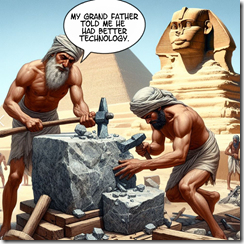Why Stuff Does Not Work: Airplane Doors, Health Care Services, and Cyber Security Systems, Among Others
January 26, 2024
 This essay is the work of a dumb dinobaby. No smart software required.
This essay is the work of a dumb dinobaby. No smart software required.
“The Downward Spiral of Technology” stuck a chord with me. Think about building monuments in the reign of Cleopatra. The workers can check out the sphinx and giant stone blocks in the pyramids and ask, “What happened to the technology? We are banging with bronze and crappy metal compounds and those ancient dudes were zipping along with snappier tech.? That conversation is imaginary, of course.
The author of “The Downward Spiral” is focusing on less dusty technology, the theme might resonate with my made up stone workers. Modern technology lacks some of the zing of the older methods. The essay by Thomas Klaffke hit on some themes my team has shared whilst stuffing Five Guys’s burgers in their shark-like mouths.
Here are several points I want to highlight. In closing, I will offer some of my team’s observations on the outcome of the Icarus emulators.
First, let’s think about search. One cannot do anything unless one can find electronic content. (Lawyers, please, don’t tell me you have associates work through the mostly-for-show books in your offices. You use online services. Your opponents in court print stuff out to make life miserable. But electronic content is the cat’s pajamas in my opinion.)
Here’s a table from the Mr. Klaffke essay:
Two things are important in this comparison of the “old” tech and the “new” tech deployed by the estimable Google outfit. Number one: Search in Google’s early days made an attempt to provide content relevant to the query. The system was reasonably good, but it was not perfect. Messrs. Brin and Page fancy danced around issues like disambiguation, date and time data, date and time of crawl, and forward and rearward truncation. Flash forward to the present day, the massive contributions of Prabhakar Raghavan and other “in charge of search” deliver irrelevant information. To find useful material, navigate to a Google Dorks service and use those tips and tricks. Otherwise, forget it and give Swisscows.com, StartPage.com, or Yandex.com a whirl. You are correct. I don’t use the smart Web search engines. I am a dinobaby, and I don’t want thresholds set by a 20 year old filtering information for me. Thanks but no thanks.
The second point is that search today is a monopoly. It takes specialized expertise to find useful, actionable, and accurate information. Most people — even those with law degrees, MBAs, and the ability to copy and paste code — cannot cope with provenance, verification, validation, and informed filtering performed by a subject matter expert. Baloney does not work in my corner of the world. Baloney is not a favorite food group for me or those who are on my team. Kudos to Mr. Klaffke to make this point. Let’s hope someone listens. I have given up trying to communicate the intellectual issues lousy search and retrieval creates. Good enough. Nope.
Yep, some of today’s tools are less effective than modern gizmos. Hey, how about those new mobile phones? Thanks, MSFT Copilot Bing thing. Good enough. How’s the MSFT email security today? Oh, I asked that already.
Second, Mr Klaffke gently reminds his reader that most people do not know snow cones from Shinola when it comes to information. Most people assume that a computer output is correct. This is just plain stupid. He provides some useful examples of problems with hardware and user behavior. Are his examples ones that will change behaviors. Nope. It is, in my opinion, too late. Information is an undifferentiated haze of words, phrases, ideas, facts, and opinions. Living in a haze and letting signals from online emitters guide one is a good way to run a tiny boat into a big reef. Enjoy the swim.
Third, Mr. Klaffke introduces the plumbing of the good-enough mentality. He is accurate. Some major social functions are broken. At lunch today, I mentioned the writings about ethics by Thomas Dewey and William James. My point was that these fellows wrote about behavior associated with a world long gone. It would be trendy to wear a top hat and ride in a horse drawn carriage. It would not be trendy to expect that a person would work and do his or her best to do a good job for the agreed-upon wage. Today I watched a worker who played with his mobile phone instead of stocking the shelves in the local grocery store. That’s the norm. Good enough is plenty good. Why work? Just pay me, and I will check out Instagram.
I do not agree with Mr. Klaffke’s closing statement; to wit:
The problem is not that the “machine” of humanity, of earth is broken and therefore needs an upgrade. The problem is that we think of it as a “machine”.
The problem is that worldwide shared values and cultural norms are eroding. Once the glue gives way, we are in deep doo doo.
Here are my observations:
- No entity, including governments, can do anything to reverse thousands of years of cultural accretion of norms, standards, and shared beliefs.
- The vast majority of people alive today are reverting back to some fascinating behaviors. “Fascinating” is not a positive in the sense in which I am using the word.
- Online has accelerated the stress on social glue; smart software is the turbocharger of abrupt, hard-to-understand change.
Net net: Please, read Mr. Klaffke’s essay. You may have an idea for remediating one or more of today’s challenges.
Stephen E Arnold, January 25, 2024




